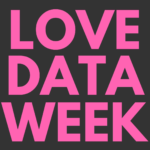by Vanja Lugonjic and Maya Willard-Stepan
Did you know that the Library offers free online workshops to help with your research?

The Digital Scholarship Hub at the McGill Library is proud to present its Winter 2021 Workshop Schedule. This semester we are offering 31 interactive workshops, and lively discussions on artificial intelligence, research data management, digital scholarship tools, scholarly communications, and more!

Workshops are listed on our Digital Scholarship Hub’s calendar and the Library’s workshops page. We have put together a few noteworthy events to check out!
From February 8th – 12th the McGill library is hosting Love Data week. We will be offering workshops on data analysis ethics, and much more throughout the week. Take a look at some of our offerings.
“What’s the Deal with Data?”
Monday Feb 8th, 10:00 -11:00 AM EST
Kicking off Love data week, this session will give individuals an introduction to the world of data, including the what, why, where, and how of data. For those who are uncertain about data, and want to start learning something new – includes examples in both standard (like the social sciences) and non-standard fields (such as art).
Register here.
“#CovidArt: Bridging the Gap Between Science, Art, and the Public”
Thursday, Feb 11th, 10:00 am to 11am
In the summer of 2020, Récherche Québec launched an initiative that asked artists and researchers to collaborate on an art project under the hashtag #covidart. Artist Shelley Miller and epidemiologist Joanna Merckx worked together on Graphic/Graphique, a mural that uses data to visualize how the different Montreal boroughs were affected by the first wave of COVID-19. Join them for a conversation about their project, data use for art, alternative ways of disseminating data, and the intersection between STEM and Art.
Register here.
“Know your Rights: What to consider before you submit to a journal and sign a copyright transfer agreement”
Tuesday, February 16, 12:00- 1:30 PM EST
This workshop will engage in practical, hands-on exercises to review the author agreements of major journal publishers. During the session we will look at actual copyright transfer agreements and publisher policies.
At the end of this session participants will be able to: identify and compare copyright transfer agreements between journal publishers, Evaluate journals based on their author rights agreements, and describe which author rights are retained/transferred in these agreements. If you’ve published (or are planning to publish soon), please bring along any relevant examples from your own experience.
Register here.
“Keeping up with Artificial Intelligence: AI Ethics & Bias”
Tuesday, March 23rd, 2:30-4:30 PM EST
This presentation aims to cover some of the core issues surrounding the ethical debate with AI, open up discussions about how to overcome these issues, and broaden our understanding of the technology. Participants will delve into case studies for biased AI, promote ethical solutions for AI development, evaluate the privacy concerns of AI in everyday use and navigate the current landscape of AI policies.
*Note that this workshop will not discuss the mechanics of AI, but rather its implications on society.
Register here.
We also offer support for digital research projects of McGill faculty, students, and staff tailored to their research needs. Contact us to schedule an appointment with one of our experts.
Questions? Contact us at dshub.library@mcgill.ca
